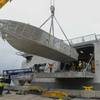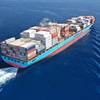US Launches Multi-National Operation to Safeguard Red Sea Commerce
The United States on Tuesday launched a multinational operation to safeguard commerce in the Red Sea as attacks by Iran-backed Yemeni militants forced major shipping companies to reroute, stoking fears of sustained disruptions to global trade.
The Houthi militant group, which controls vast amounts of territory in Yemen after years of war, has since last month fired drones and missiles at international vessels sailing through the Red Sea - attacks it says respond to Israel's devastating assault on the Hamas-ruled Gaza Strip.
This week, the attacks began to take a toll on global trade, disrupting a key trade route that links Europe and North America with Asia via the Suez Canal.
Oil major BP BP.L paused all Red Sea transits, and a slew of top shipping firms including Maersk started diverting shipments normally made through Suez around the Cape of Good Hope on Africa's southern tip. The new route around Africa adds days to journey times and raises costs. The list of companies avoiding the Red Sea continued to grow on Tuesday.
The crisis, which has grown out of the war between Israel and Palestinian Islamist group Hamas, is the latest in the Middle East to pit the United States and its allies against Iran and its regional Arab proxy militias.
Hamas killed 1,200 Israelis in a cross-border raid on Oct. 7, drawing a devastating Israeli offensive that has killed more than 19,000 Palestinians in Gaza.
Iranian proxies including the Houthis and Lebanese Hezbollah have fired rockets at Israel since the conflict began. The Houthis, meanwhile, have stepped up their Red Sea attacks, threatening to target all ships heading to Israel and warning shipping companies against dealing with Israeli ports.
U.S. Secretary of Defense Lloyd Austin, who is on a trip to Bahrain, home to the U.S. Navy's headquarters in the Middle East, said Britain, Bahrain, Canada, France, Italy, the Netherlands, Norway, Seychelles and Spain were among nations involved in the Red Sea security operation.
The group, widely dubbed in media reports a "task force," will conduct joint patrols in the southern Red Sea and the adjacent Gulf of Aden.
"This is an international challenge that demands collective action," Austin said in a statement, announcing the initiative as "Operation Prosperity Guardian." He called on other countries to contribute as he condemned "reckless Houthi actions".
But it was unclear how many other countries are willing to do what mostly U.S. warships have done in recent days - shoot down Houthi missiles and drones, and rush to the aid of commercial ships under attack.
A European diplomat whose country will take part in the task force said the idea of the operation was for participating nations' ships to shoot down missiles and drones and accompany vessels through the Red Sea.
The Houthis, in a statement late on Tuesday, said they were only targeting Israeli ships or ships heading into Israeli ports and posed no threat to any country, but accused the new U.S.-led task force of being "part of the aggression against Gaza and the Palestinian people."
Mohammed Ali al-Houthi, a senior Houthi official, told Iranian TV on Tuesday that any country acting against Houthi forces would see its ships targeted in the Red Sea
A U.S. military official who spoke on condition of anonymity played down the idea that naval ships would escort commercial vessels, given that hundreds normally travel the route daily, but said the U.S. operation would position ships in areas where they could have the greatest security benefit.
Impact on global trade
BP's decision to temporarily pause all transit through the Red Sea and oil tanker group Frontline's saying its vessels would avoid passage through the waterway showed that the crisis was broadening to include energy shipments. Crude oil prices rose for a second straight day on Tuesday as the Houthi attacks on ships disrupted trade and more companies were forced to reroute vessels.
Shipping companies continued to reroute on Tuesday. Denmark's Maersk, which had paused Red Sea shipping, said it would sail its ships around Africa until further notice.
Maersk said the Red Sea task force was a "positive" development, but said it was seeking more details on how it would work.
"With the line of impacted vessels building fast in the area, progressing with speed will be key for the coalition in order to minimise direct negative impact on global trade," a Maersk statement said.
International firms said they were drawing up contingency plans. Sweden's Electrolux said it had set up a task force to find alternative routes or identify priority deliveries if needed.
Many other ships were still plying the Red Sea, though several ships had armed guards onboard, LSEG data showed. A number of container vessels were anchored and others turned off tracking systems as traders adjusted routes and prices in response to the maritime attacks.
Industry sources said the impact on global trade would depend on how long the crisis persists, but insurance premiums and longer routes would be immediate burdens.
The longer trip will cost up to $1 million extra in fuel for every round trip between Asia and Northern Europe, according to estimates from freight platform Xeneta.
Economic policymakers said it was too early to assess the broader financial impact, but the main concern was whether disruption would get serious enough to ignite a new round of global inflation, just as central banks are finally overcoming price pressures after the COVID-19 pandemic.
About 12% of world shipping traffic usually transits via the Suez Canal, the shortest shipping route between Europe and Asia, passing then as well into Red Sea waters off Yemen.
Iran denies blame
Austin said on Monday that Iran was behind the Houthi attacks. Iran denies involvement but says it supports its Houthi allies.
The European diplomat said the task force aimed to send a strong signal to Iran and its proxies. "There is no doubt Houthis are acting on behalf of Iran," the diplomat said, speaking on condition of anonymity.
Many major Arab allies of the United States have so far declined to join the task force. Bahrain's defense minister met Western counterparts to discuss maritime security, an official social media page said on Tuesday, but gave no other details.
(Reuters - Reporting by Phil Stewart, Mohammed Ghobari, Yuka Obayashi, Lisa Barrington, John Irish, Anne Kauranen, Nayera Abdallah, Josephine Mason, Jacob Gronholt-Pedersen, Jonathan Saul, Reuters bureaux, Dubai newsroom; writing by John Davison, Alexander Cornwell, Elisa Martinuzzi; editing by Hugh Lawson, Mark Heinrich and Leslie Adler)











